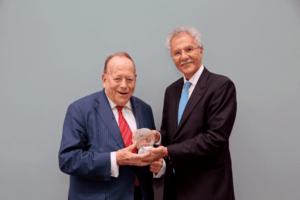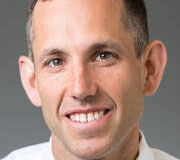Roger Malcolm Greenhalgh, MD, the surgeon internationally renowned for his unparalleled contribution to vascular education, training and research, died peacefully on Oct. 6. He was 82. At the time of his death, he was emeritus professor of surgery at Imperial College in London and head of its Vascular Surgery Research Group.
Professor Greenhalgh, born in Derbyshire, was not from a medical background. His parents were very entrepreneurial in their different ways, and his grandfather, Fred Poynton, broke the world record in road walking over 20 miles in 1924. He went to Ilkeston Grammar School, a state school with entry by scholarship only. There he followed the advice of his headmaster, John Hewitson, that he should consider medicine as a career. He was the first in his family to attend university. Within a term of arriving at Clare College, Cambridge, his medical tutor, Dr. Gordon Wright, predicted that Roger would be a surgeon. At St. Thomas’s Hospital in London, he qualified as a doctor and was allowed to move up the surgical ladder with a rotation to learn research methods at the Hammersmith Hospital after his surgical training at St. Thomas’s. During this time, he discovered a love of vascular surgery. The pioneer vascular surgeon, Peter Martin, inspired him by saying that he would go on to solve problems that he could not. Whilst in training, in 1974, he won the prestigious Moynihan Fellowship of the Association of Surgeons of Great Britain & Ireland. The £1,000 stipend enabled him to visit many worldwide vascular centers of excellence using the connections of his mentors, including Martin, Frank Cockett and Professor Gerry Taylor.
Roger joined the surgical consultant staff as senior lecturer at Charing Cross Hospital in 1976, less than 10 years after being a medical student. His career did not follow a conventional path by moving from the St. Thomas’s system to St. Barts and, finally, to Charing Cross. He went on to become professor of surgery, head of the university department and dean of the Charing Cross & Westminster Medical School for four years, between 1993 and 1997, during which time he oversaw a merger with Imperial College London. His junior at St. Bart’s and then secretary of the Vascular Society of Great Britain and Ireland (VSGBI), Professor Bruce Campbell, said to Professor Greenhalgh, who was the millennium president of the Vascular Society from 1999–2000: “You always do your own thing, you know you do.”

Professor Greenhalgh’s long and distinguished research career started with an interest in hyperlipidemia when he was a resident, during which he attempted to elucidate the role played by serum lipids and lipoproteins in arterial disease as lead author of a 1971 paper published in The Lancet. His research, with more than 300 original published papers, spanned all areas of vascular surgery: venous, carotid, peripheral and aortic. His most significant contributions came from his early adoption of the rigor of prospective randomized trials to address the gray areas in vascular disease management. He led more than a dozen trials in the field of aneurysm management to promote level-one evidence in clinical practice, including the UK Small Aneurysms Trial (UKSAT) and the UK endovascular aneurysm repair (EVAR 1 and 2) trials. UKSAT was the first trial to show that there was no long-term survival benefit of early elective open repair of small abdominal aortic aneurysms. The 15-year follow up of the EVAR 1 and 2 trials were published in The Lancet in 2016 showing EVAR has an early survival benefit but an inferior late survival compared with open repair, which needs to be addressed by lifelong surveillance of EVAR and reintervention if necessary. Professor Greenhalgh was also the principal investigator of the mild to moderate intermittent claudication (MIMIC) trials, which finally proved the adjuvant benefit of angioplasty over supervised exercise and best medical therapy in patients with stable mild and moderate intermittent claudication.
Inspired by the impact of these many landmark trials, Andrew W. Bradbury, the Sampson Gamgee Professor of Vascular Surgery at University of Birmingham, England, and principal investigator of the randomized controlled BASIL trials, wrote to Professor Greenhalgh: “Your achievements are greater than anyone alive or dead.” Professor Bradbury recently presented first-time results from the BASIL-2 trial at the 2023 Charing Cross (CX) International Symposium during a session chaired by Professor Greenhalgh.
Professor Greenhalgh founded the Charing Cross series of international symposia and annual books in 1978 when he was 37 years of age. This started as a small, focused symposium, with topics such as smoking and arterial disease, held at the Charing Cross Hospital. The earliest symposia had just 100–200 delegates but were always accompanied by a book covering the main presentations and discussions. The CX Symposium has grown exponentially and has been forced to move to much bigger venues to cope with the increasing popularity of the meeting, which peaked at over 4,000 in-person attendees in the years immediately before the COVID-19 pandemic. Pioneers such as Michael DeBakey, Denton Cooley, Jesse Thompson, John Mannick, John Bergan, Jimmy Yao, Ted Diethrich, Juan Parodi and Frank Veith have all graced the podium. Tom Fogarty spoke of his catheter and Andreas Grüntzig spoke of his angioplasty in the 1980s. Julio Palmaz gave news of EVAR at CX 1990. CX continues to provide top-class vascular education and critical discussion of cutting-edge developments in the management of vascular disease. Professor Greenhalgh presided over the 45th symposium earlier this year. Many speakers feared his acerbic wit and the tolling of the bell if they strayed overtime.

Professor Greenhalgh, who was quick to embrace digital methods of transmission, recently spoke from the state-of-the-art CX Vascular studio in London to detail the global interest in the Charing Cross brand of education. In 2023, the symposium saw registrations from 2,500 in-person attendees and an additional 7,000 people participated digitally, tuning in mainly from China. He was always in his element at the CX podium, his secret passion for the theatre on full display, enjoying the cut and thrust of discussing the current, hot-button issues in the vascular field with global experts. Age did not wither nor custom stale his delight in unpicking an argument to get to the core of the matter, always endeavoring to outline the research and education required to drive the topic forward. In the days before his passing, Professor Greenhalgh’s passion for the quality of the CX Symposium program burned brightly right to the very end as he worked on the CX 2024 version in the Hammersmith Hospital’s De Wardener ward intensive care unit.
Professor Greenhalgh played a pivotal role in the creation of the European Society for Vascular Surgery (ESVS) and the establishment of its journal. The ESVS was launched at CX in 1987 and Professor Greenhalgh wrote the constitution. He was founder and chairman of the editorial board for the European Journal of Vascular and Endovascular Surgery (EJVES) from 1987–2003. He became the first ESVS European honorary member because of his role in the ESVS foundation. He also played a major role in the development of surgical training and standards across Europe through his role as president of the European Board of Surgery for the European Union of Medical Specialists (Union Européenne des Médecins Spécialistes—UEMS) from 1998–2002 and the European Board of Vascular Surgery (2002–2006). The European Board of Vascular Surgery honored Professor Greenhalgh as Honorary Life President in recognition of his founding role.
His brilliant surgical skills were recognized by innumerable international surgical societies as well as the White House Medical Unit for the support he provided during the visit of President George H. W. Bush to London in 1991. More recently, Professor Greenhalgh became a company director, founding BIBA Medical with his son, Stephen, in 1994. Professor Greenhalgh was editor-in-chief of the company’s foremost medical publication, Vascular News, from its inception in 1999–2023, overseeing a total of 100 editions of the newspaper in this time. He captured his experiences in the roles of surgeon, professor and company director in his 2011 autobiography, Born to be a Surgeon.

Professor Greenhalgh received recognition for his lifelong contributions to vascular surgery from multiple prestigious groups, including most recently, an honorary Fellowship of the American College of Surgeons in October 2018 and the first Living Legend or International Lifetime Achievement Award from the Society for Vascular Surgery (SVS) in June 2018 after being nominated by the ESVS. Enrico Ascher, of New York University in New York City, who presented the award and is a past president of the SVS, said of Professor Greenhalgh at the time: “He leads by example. Not only by his contributions, or his political influence, or his knowledge, or trials, but actually as a person. As a person who is totally committed to his profession, to his family, to his friends, to his peers. He thinks first about them, and not about himself. That is what makes him a moral leader, and what sets him apart.”
Writing in EJVES following Professor Greenhalgh’s receipt of this award, his long-time research partner, Professor Janet Powell, of Imperial College in London, England, described him as a “brilliant” clinician with a “long and distinguished” research career, as well as highlighting his prowess as an educator and mentor, noting that “medical students and junior doctors have queued for the opportunity to work in his team.” She also hailed him as a “legendary figure” whose wit, humor and charm “have made him many friends across the world.”
Professor Greenhalgh had many sporting skills and interests. He rowed in international regattas with future Olympian, Peter Thomas, at stroke whilst he was captain of boats as a medical student at St. Thomas’s Medical School. He remained a strong supporter of the Imperial College Boat Club and even had a boat named after him. His love of skiing saw him create the Association of International Vascular Surgeons (AIVS), which was used to forge international professional friendships and the AIVS continues to this day under the chairmanship of Mark A. Adelman. He was supported throughout by his Austrian wife, Karin, whose ability to speak multiple European languages and communicate with people from all cultures, proved invaluable.
Roger Greenhalgh was married to Karin Maria (née Gross), who died in April 2020 from COVID-19. They were happily married for over 55 years and her constant support was integral to his success. He was at his most relaxed amongst his family. He is survived by his two children, Stephen (Lord Greenhalgh) and Christina, and three grandchildren Sebastian, Francesca and Marcus, of whom he was immensely proud.
The Professor Roger M. Greenhalgh book of condolence can be found here: https://www.memorialstory.com/memorials/8cb0e8f5-acc6-49b4-8ffa-ebe3047d2cba/roger-malcolm-greenhalgh. Please post your messages, stories and photos to commemorate his life and legacy.













On the shoulders of giants thus we stand and see more clearly.